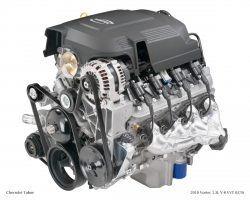
— A GM class action lawsuit over oil consumption has been dismissed after three vehicle owners claimed their General Motors vehicles consumed excessive amounts of oil due to defective Generation IV 5.3-liter V8 Vortec 5300 LC9 engines.
The allegedly defective vehicles are 2010-2014 GM models equipped with the LC9 engines.
One plaintiff owns a 2012 Chevrolet Avalanche and the other two plaintiffs own 2011 GMC Sierra trucks, all with engines that allegedly misfire, consume too much oil, knock and eventually fail.
The plaintiffs allege the problems they experienced with their engines were caused by design defects which caused failures of the engine's piston rings to keep oil in the crankcase because GM coated the rings with defective anti-friction and anti-wear material.
The GM class action lawsuit says the automaker breached warranties, but the plaintiffs don't allege they ever asked GM or its dealers to repair the vehicles during the warranty periods.
GM also allegedly knew the vehicles suffered from oil consumption problems but failed to inform customers, allegedly making the automaker liable for fraudulent misrepresentation and unjust enrichment.
GM Class Action Lawsuit Dismissed
GM's first argument is that its express warranty applies only to defects in "materials and workmanship," which excludes design defects such as the alleged oil consumption defect.
GM's second argument is that, even if the defect was within the scope of the warranty, the plaintiffs cannot succeed on a claim for breach of warranty because they do not plead they gave GM notice of the alleged breach as required by Wisconsin law.
Judge Lynn Adelman says, "[t]he seller must be informed by the buyer that the buyer considers him (as opposed to others) responsible to remedy a troublesome situation."
"The purpose of giving such notice is "to eliminate an element of unfair surprise where a seller has not been informed that a situation is troublesome and, therefore, cannot take steps to correct it but only later has a lawsuit filed against him." — Judge Adelman
The judge notes none of the three plaintiffs allege GM was provided notice of the alleged breach, and no plaintiff alleges he ever asked GM to repair the oil consumption defect within the warranty period.
Further, no plaintiff brought his vehicle to a GM dealer for obtaining warranty service and none asked to have the oil consumption defect fixed.
According to the judge, the limited warranty did not guarantee the plaintiffs would never experience a defect, but instead it promised that if a defect "became apparent during the warranty period," GM would repair it for free. If the plaintiffs never asked for a free repair during the warranty period, then GM could not have breached the warranty.
The judge also ruled that even if GM could have breached the warranty by failing to complete repairs the plaintiffs never asked it to perform, the class action lawsuit would still have to be dismissed for failure to give notice of an alleged oil consumption problem.
Judge Adelman went on to dismiss additional claims in the class action lawsuit, including unjust enrichment and fraud claims. The judge also ruled the GM class action lawsuit cannot be amended.
The General Motors class action lawsuit was filed in the U.S. District Court for the Eastern District of Wisconsin: Brame, et al., v. General Motors LLC.




